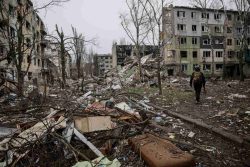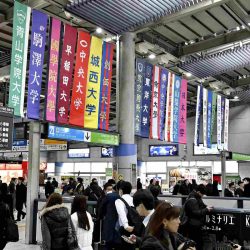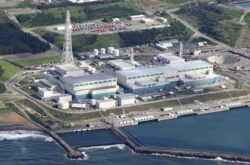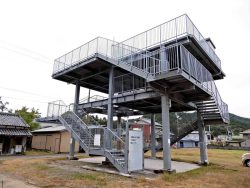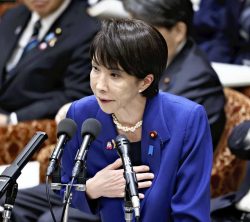Australia Lifts Terrorism Threat Level from ‘Possible’ to ‘Probable,’ But Says No Specific Threat

Australian Prime Minister Anthony Albanese, left, and Australian Security Intelligence Organization director-general Mike Burgess speak about the country’s terrorism threat alert level during a news conference at Parliament House in Canberra on Monday.
17:40 JST, August 5, 2024
MELBOURNE (AP) — The Australian government on Monday elevated the nation’s terrorism threat alert level from “possible” to “probable,” citing concerns about increasing radicalization among young people and community tensions over the Israel-Hamas war.
It is the first time the threat level has been elevated to the midpoint of the five-tier National Terrorism Threat Advisory System since November 2022. The level had been “probable” the previous eight years.
But Prime Minister Anthony Albanese added that while government officials think the current climate makes terrorism an increased danger, they didn’t know of any specific threats.
“I want to reassure Australians probable does not mean inevitable, and it does not mean there is intelligence about an imminent threat or danger,” Albanese told reporters.
He said the government was acting on the advice of the Australian Security Intelligence Organization, the nation’s main domestic spy agency known as ASIO.
“The advice that we’ve received is that more Australians are embracing a more diverse range of extreme ideologies and it is our responsibility to be vigilant,” Albanese said.
“We’ve seen a global rise in politically motivated violence and extremism. Many democracies are working to address this, including our friends in the United States and in the United Kingdom. There are many things driving this global trend towards violence. Governments around the world are concerned about youth radicalization, online radicalization and the rise of new mixed ideologies.”
Australian authorities last declared a terrorist act in April — a classification that that allows greater resourcing of a law enforcement response — when a 16-year-old boy was accused in the stabbing of a Sydney bishop while a church service was being livestreamed.
ASIO director-general Mike Burgess said more Australians are being radicalized more quickly.
“More Australians are embracing a more diverse range of extreme ideologies and more Australians are willing to use violence to advance their cause,” Burgess said,
“Politically motivated violence now joins espionage and foreign interference as our principal security concerns. These factors make ASIO’s job more difficult. The threats are becoming harder to predict and identify,” he added.
Burgess said the Australian public should be aware of the degraded security environment but not frightened.
“A threat level of ‘probable’ means we assess there is a greater than 50% chance of an onshore attack or planning in the next 12 months,” Burgess said. “It does not mean that we have intelligence about the current attack planning or expectation of an imminent attack.”
The threat level was reduced in 2022 after the Islamic State group’s territorial losses in the Middle East led to fewer investigations of extremists plotting attacks in Australia, he said.
But political polarization, intolerance and anti-authority beliefs began to build with the COVID-19 pandemic and has accelerated since the Hamas attack on Israel on Oct. 7 last year, further undermining social cohesion, he said. ASIO had successfully disrupted 24 planned extremist attacks in Australia since 2014.
There were eight attacks or planned attacks in the past four months investigated as potential terrorist acts. The suspects were age 14 to 21, underscoring a surge in youths embracing extremism, Burgess said.
“An escalation of the conflict in the Middle East, particularly in southern Lebanon, would inflict further strain, aggravating tensions and potentially fueling grievances,” Burgess said.
New Zealand’s Prime Minister Christopher Luxon told reporters that his country’s National Terrorism Threat Level would remain at its “low” designation, the second-lowest possible on a five-tier scale.
“Each country makes its own assessment,” Luxon said when asked about the Australian move, adding that New Zealand’s level was last reviewed in February.
The country’s threat level was raised briefly to “high” in the aftermath of the 2019 attack by a lone gunman at two Christchurch mosques that killed 51 people. The level dropped from “medium” to “low” in November 2022 — the same month Australia lowered its designation.
"News Services" POPULAR ARTICLE
-

American Playwright Jeremy O. Harris Arrested in Japan on Alleged Drug Smuggling
-

Japan’s Nikkei Stock Average as JGB Yields, Yen Rise on Rate-Hike Bets
-

Japan’s Nikkei Stock Average Licks Wounds after Selloff Sparked by BOJ Hike Bets (UPDATE 1)
-

Japan’s Nikkei Stock Average Buoyed by Stable Yen; SoftBank’s Slide Caps Gains (UPDATE 1)
-

Japanese Bond Yields Zoom, Stocks Slide as Rate Hike Looms
JN ACCESS RANKING
-

Tokyo Economic Security Forum to Hold Inaugural Meeting Amid Tense Global Environment
-

Keidanren Chairman Yoshinobu Tsutsui Visits Kashiwazaki-Kariwa Nuclear Power Plant; Inspects New Emergency Safety System
-

Imports of Rare Earths from China Facing Delays, May Be Caused by Deterioration of Japan-China Relations
-

University of Tokyo Professor Discusses Japanese Economic Security in Interview Ahead of Forum
-

Japan Pulls out of Vietnam Nuclear Project, Complicating Hanoi’s Power Plans




